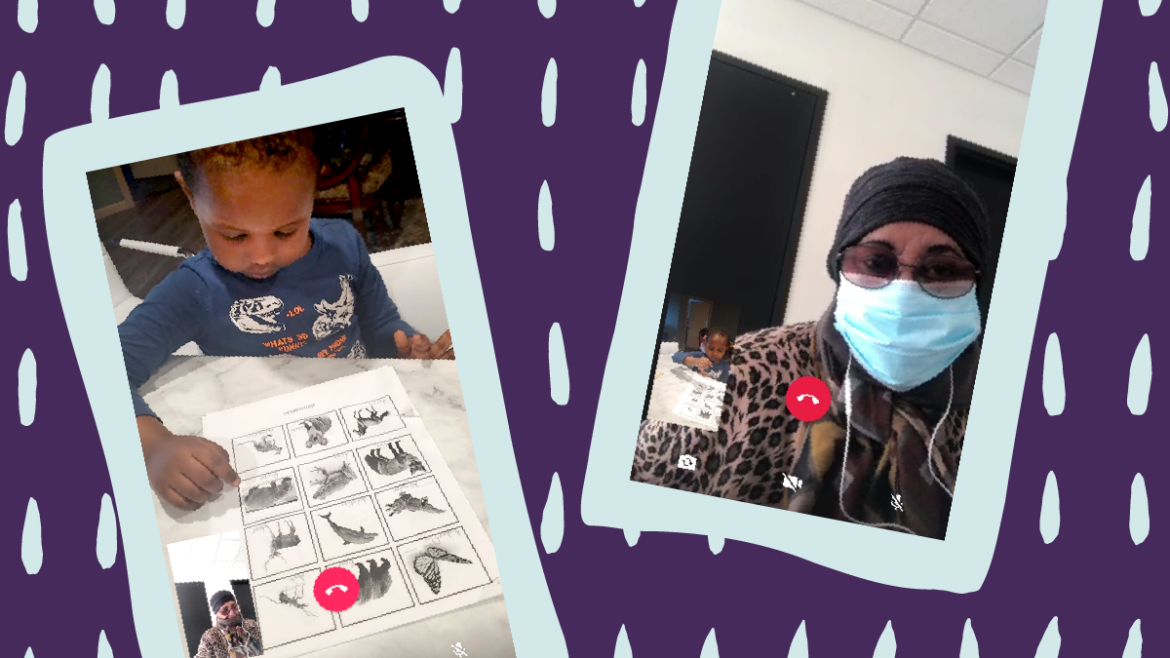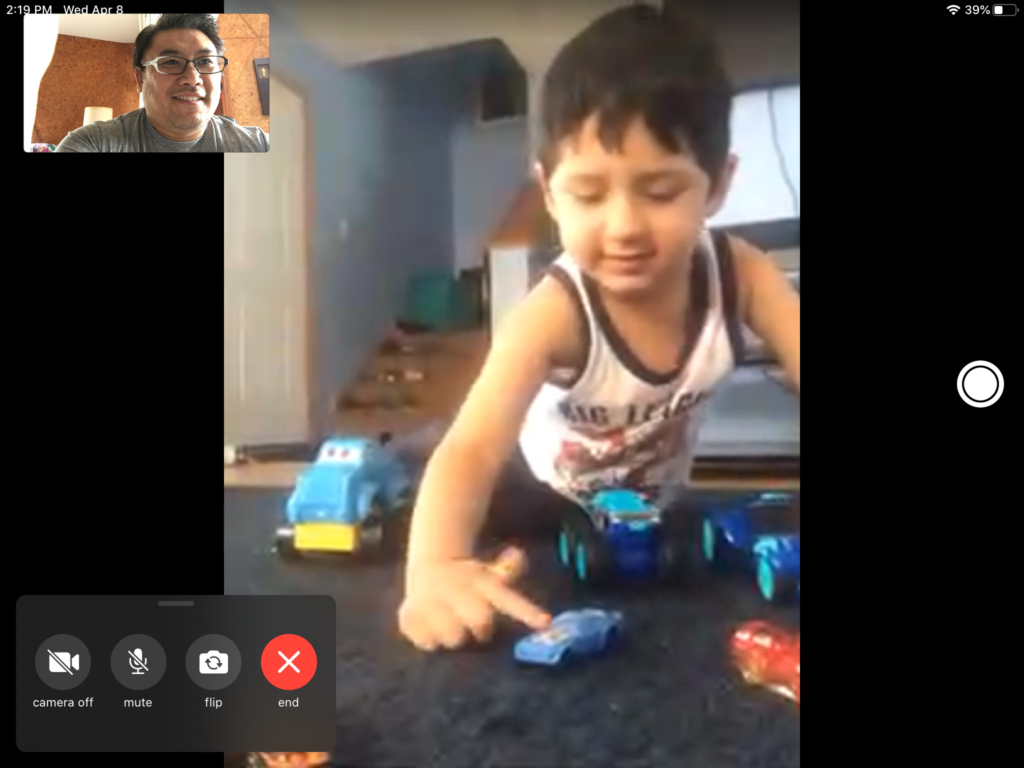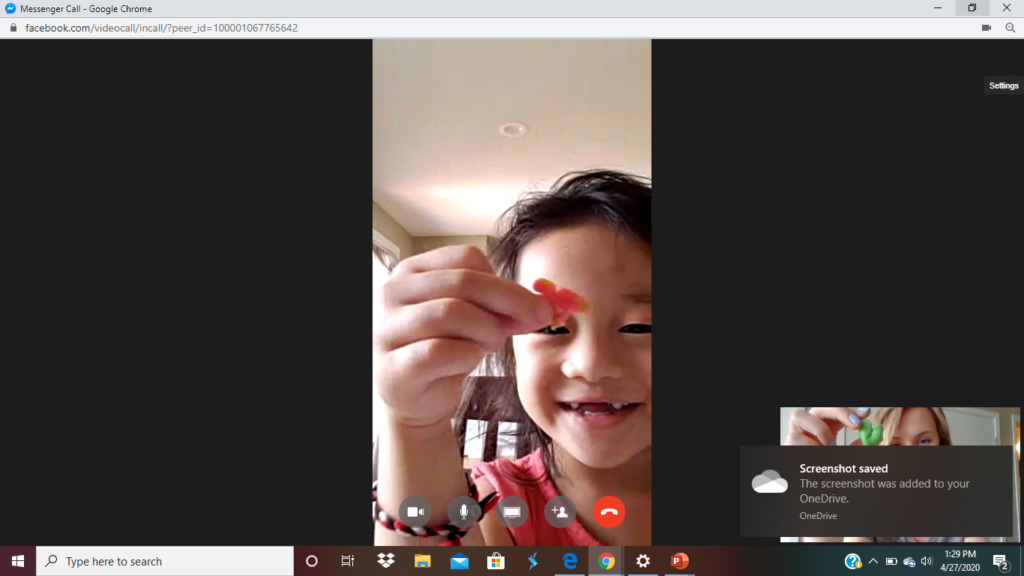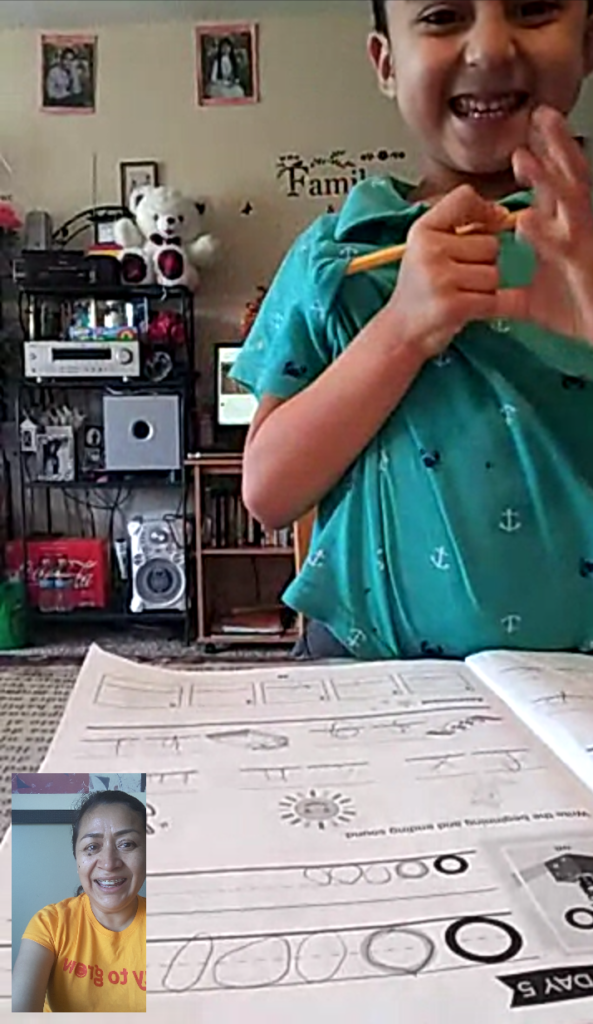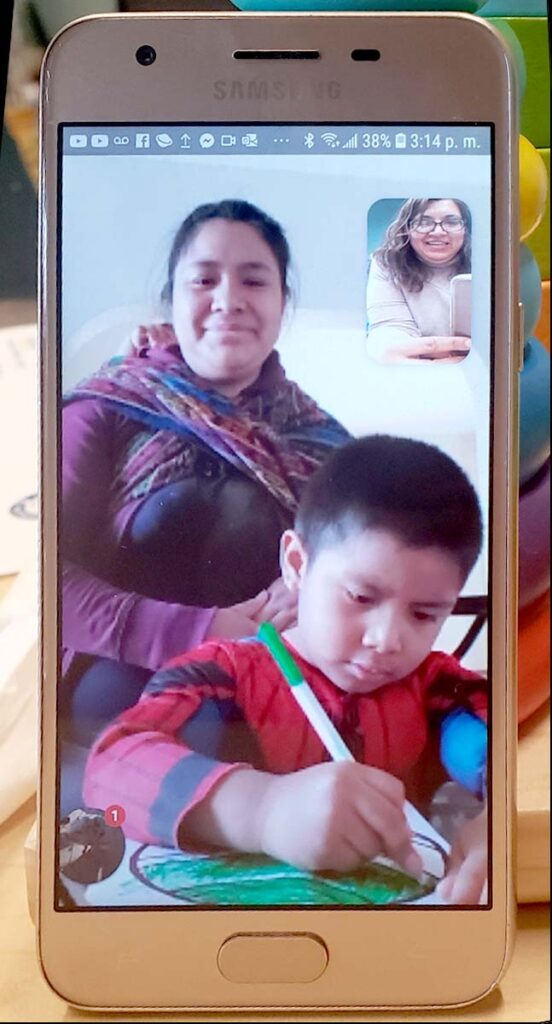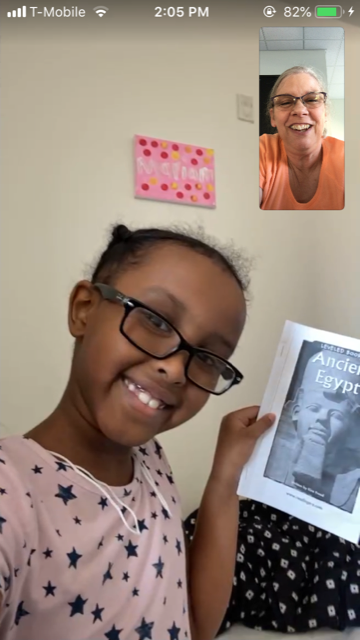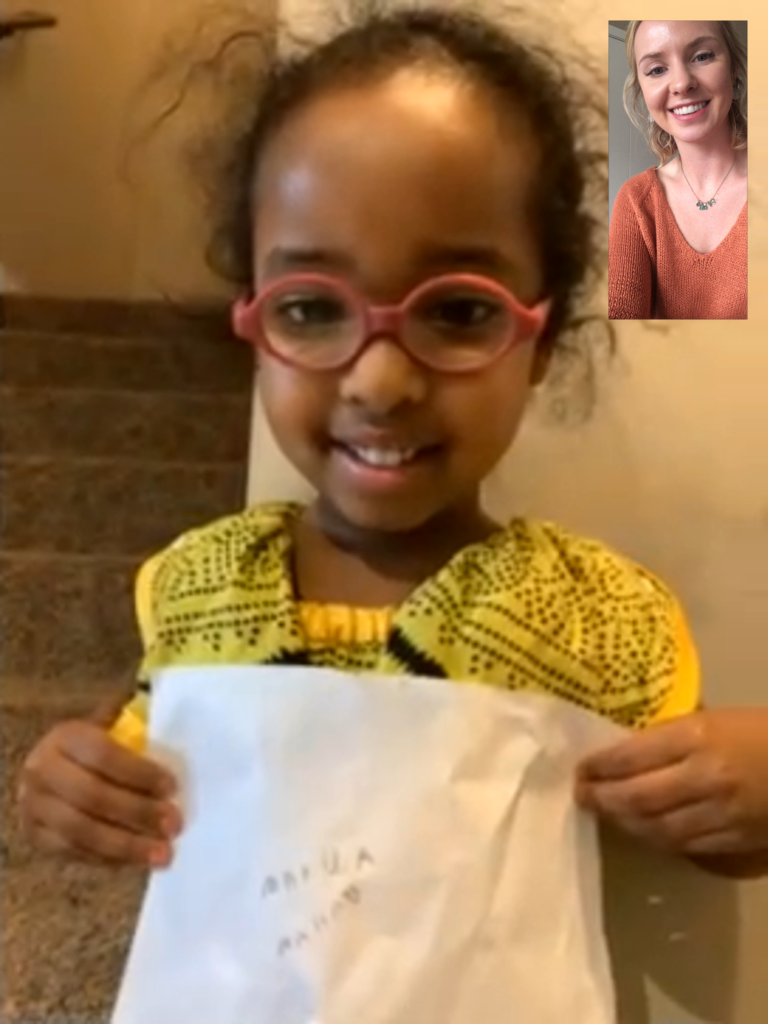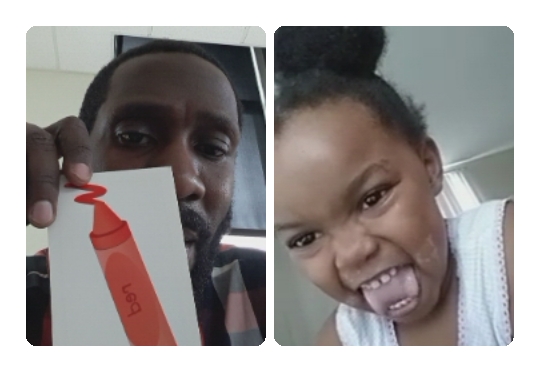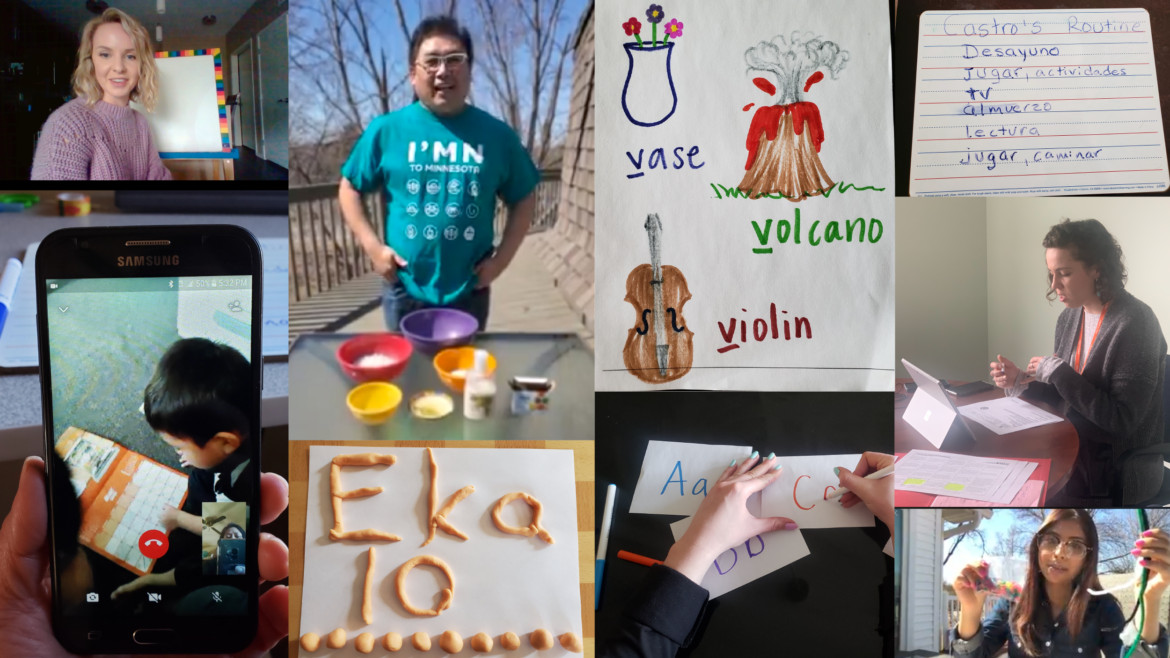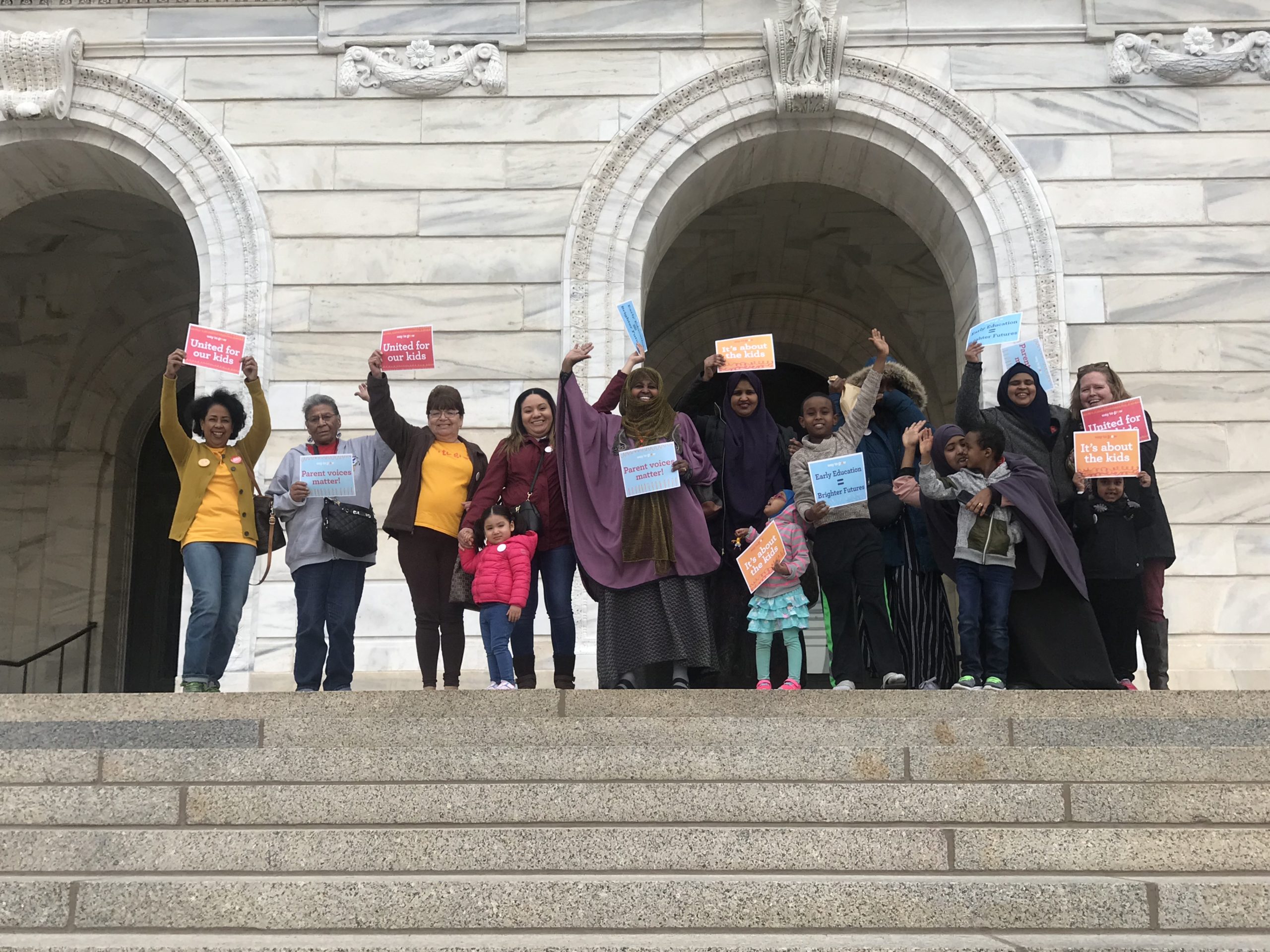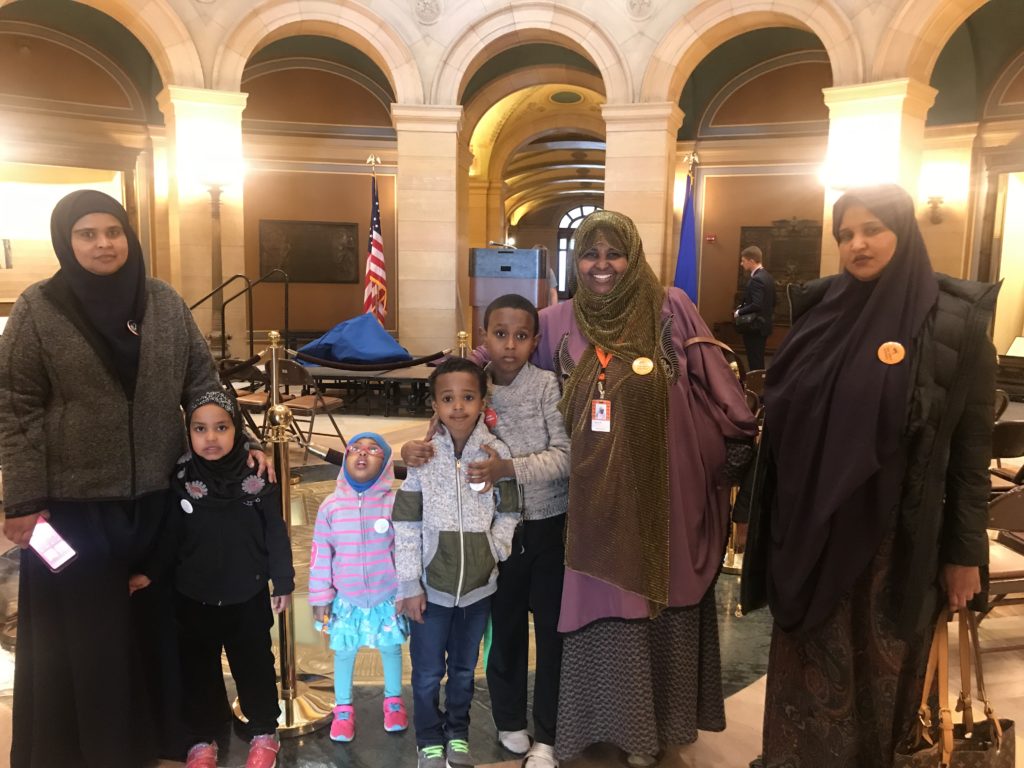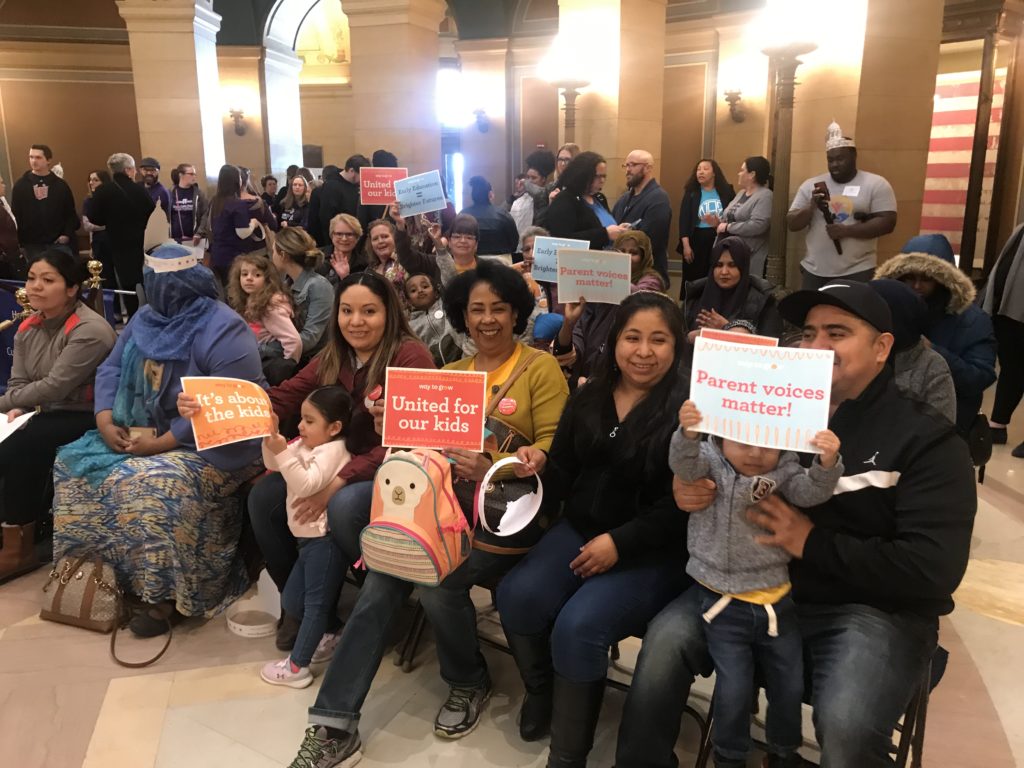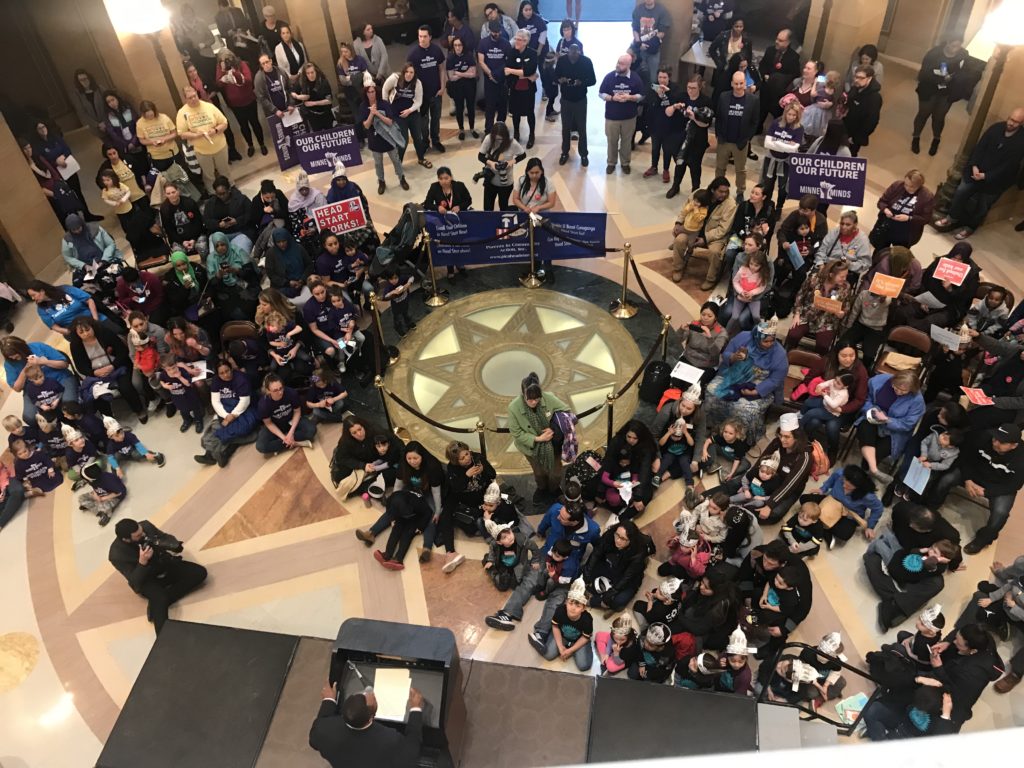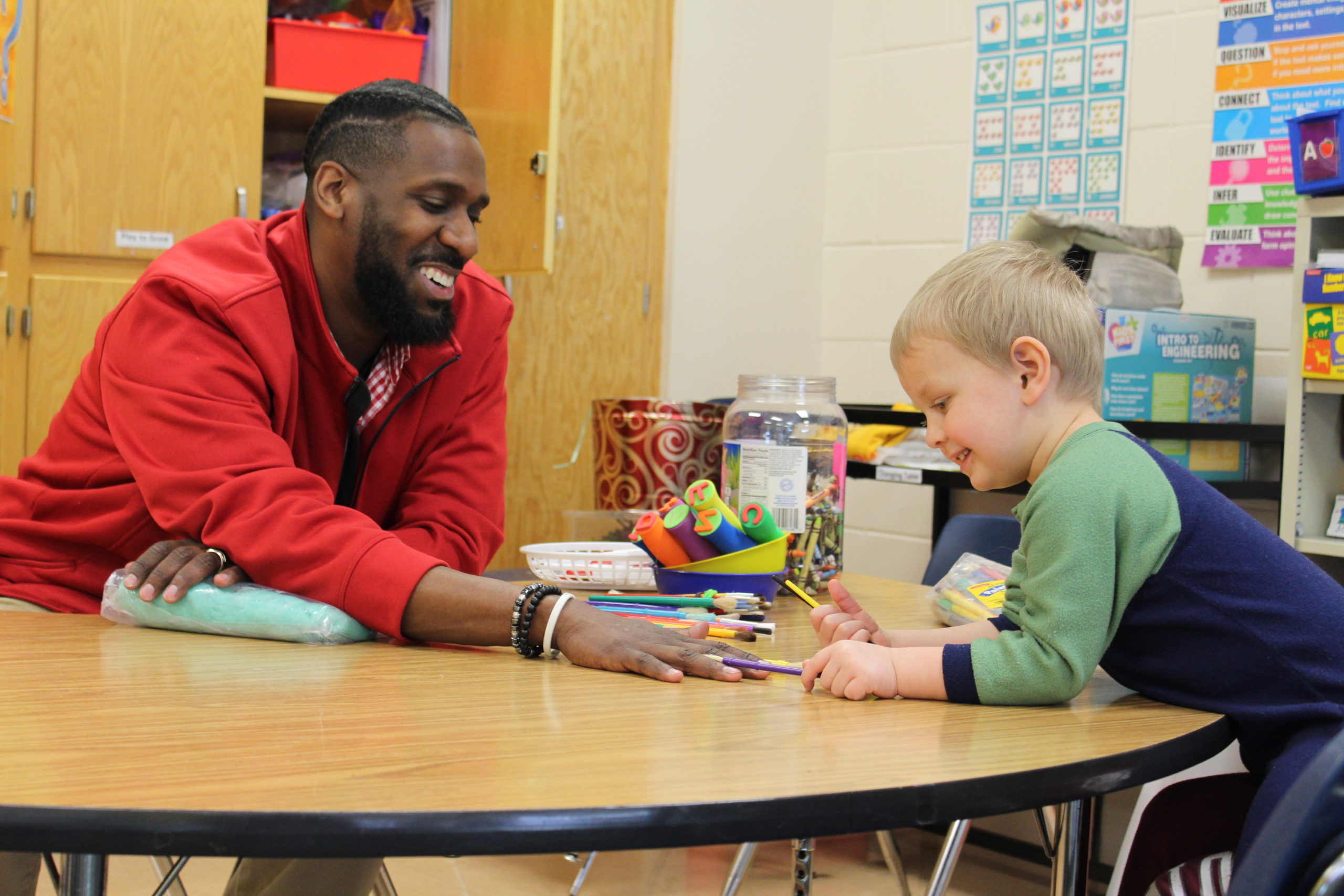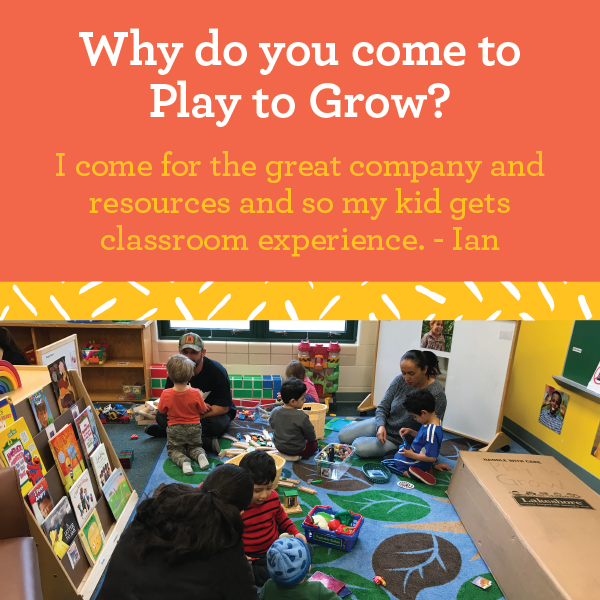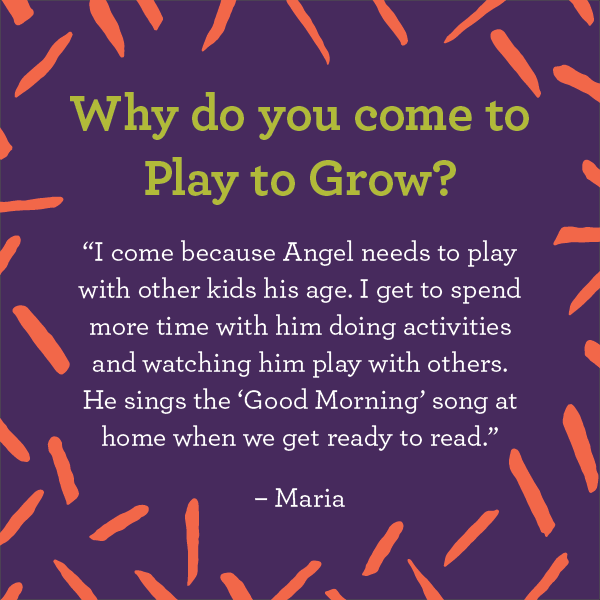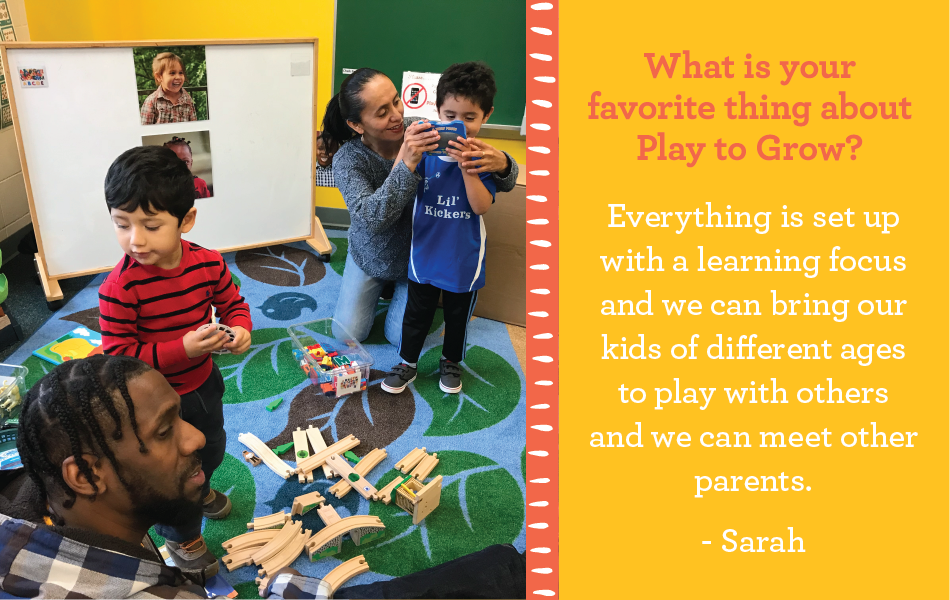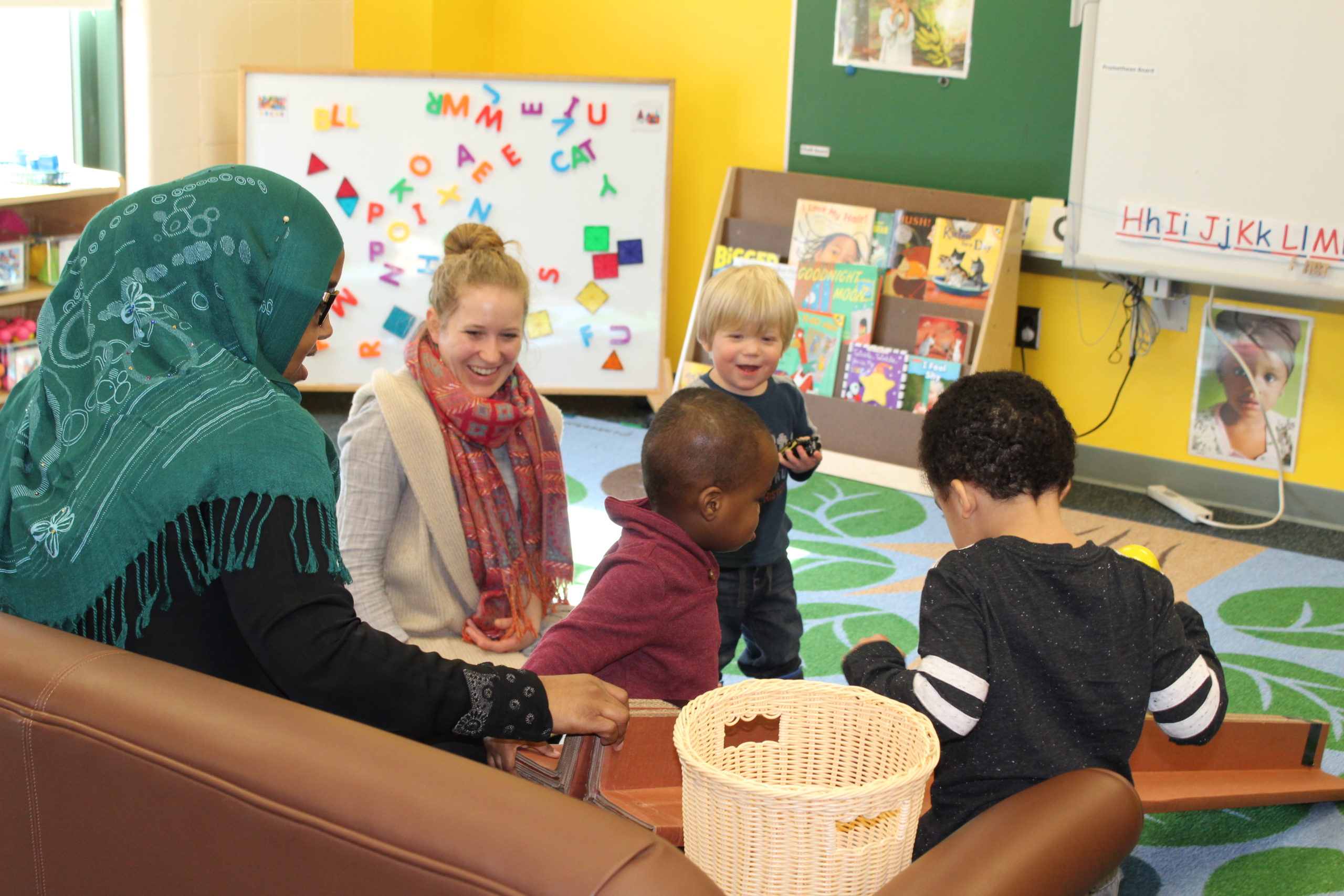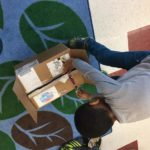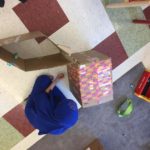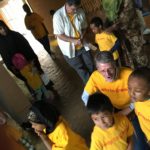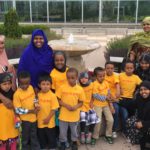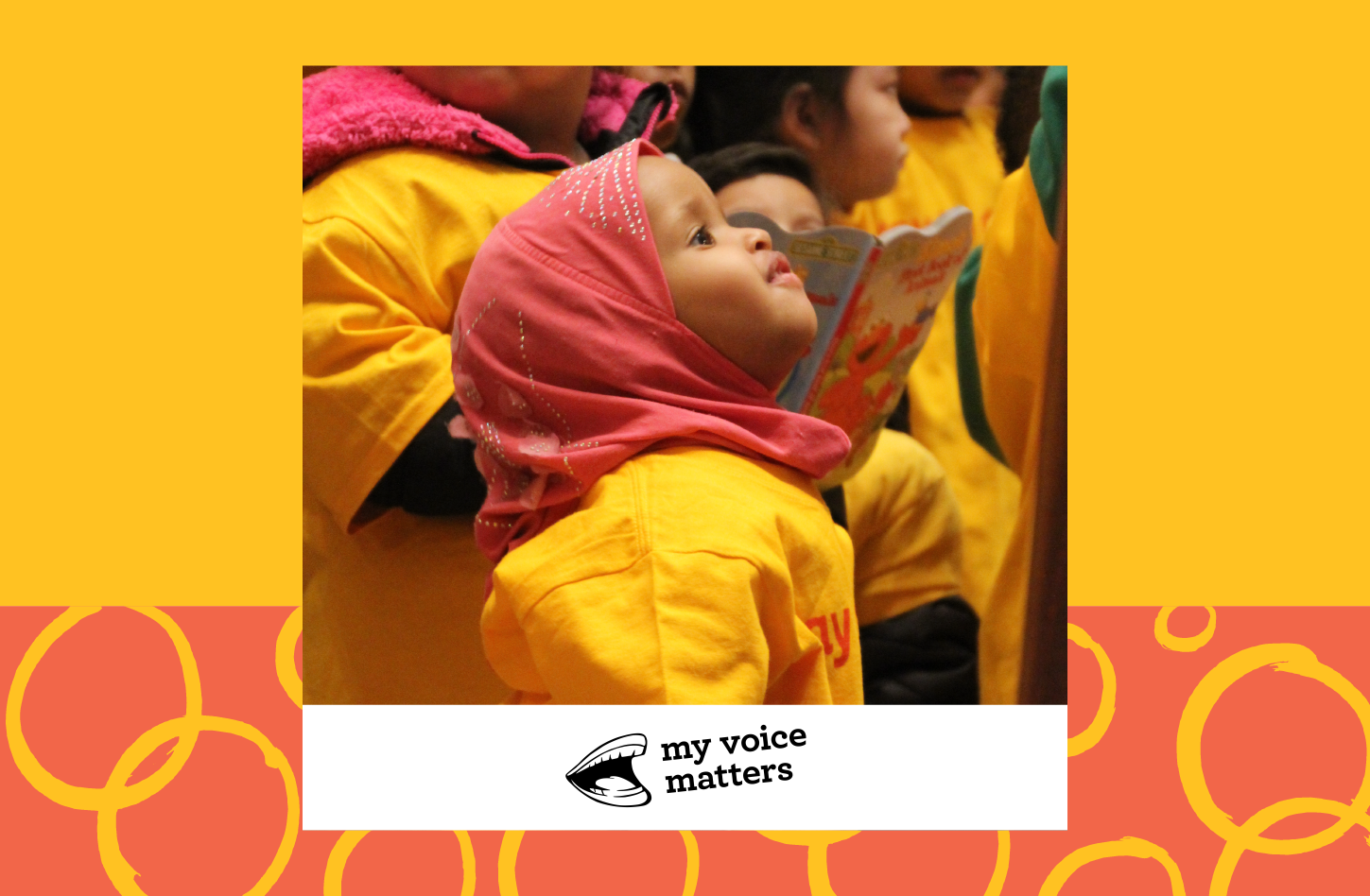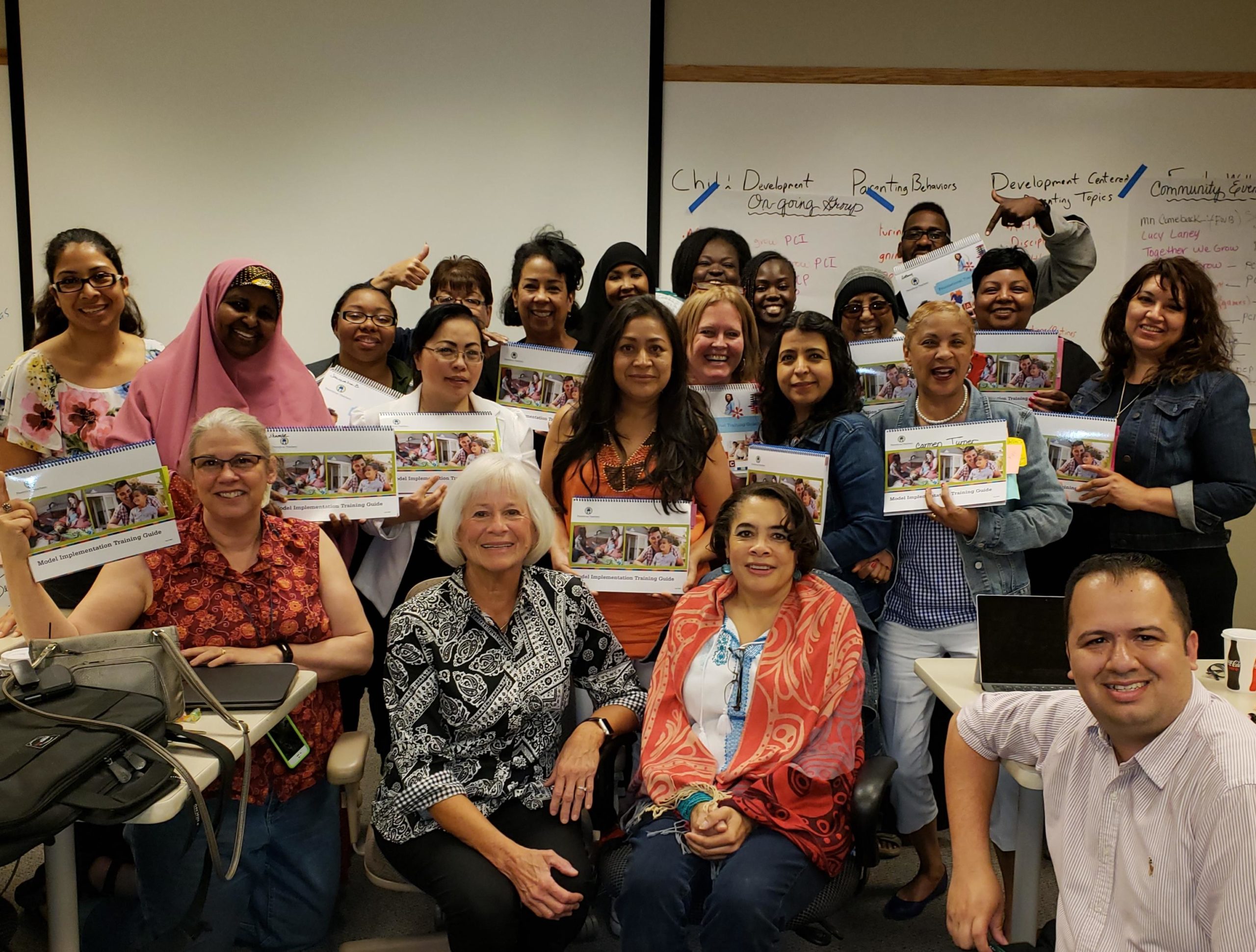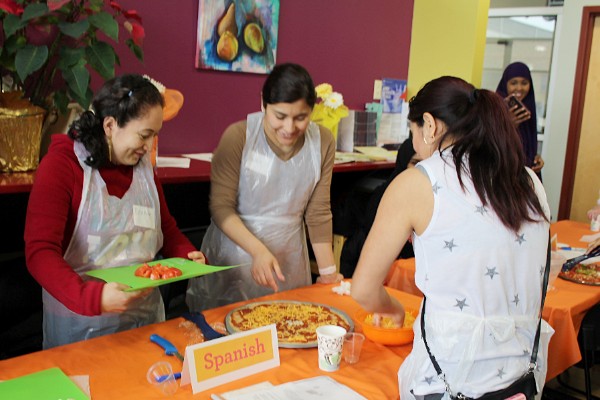Learning hasn’t stopped at Way to Grow! At recent home visits, kids were learning about Ancient Egypt and animals, they counted cars, and worked on color identification. We’re seeing progress every day. Great job, friends!
The world looks very different today—children are learning at home, many people are unable to work, and a network of services is more important than ever. To meet the increased needs of our families and still keep everyone safe and healthy, on March 16 Way to Grow moved to virtual home visits for our families. Family Educators are now staying in contact with the families they serve through whatever virtual platforms the family can access. Through their screens, our staff continues to provide valuable home visits to families—connecting them to critical resources, teaching activities to families, and answering important questions during a frightening time.
Our Program Manager Patricia, tells us that although this change happened quickly, families are so grateful to make connections despite isolation and still receive the services of Way to Grow. “They are just so joyful that they are still able to communicate with their Family Educators by FaceTime!” she said. “The kids get such a kick out of it and we didn’t miss a beat with any of our activities.” Usually staff bring materials with them to the home, so they have had to get creative. “We started to send everything to the families through email and the mail the second all of this started,” Patricia explained. “We got the materials and curriculum right out to the parents so that we could continue to work with our families.”
Even our preschool has turned into a virtual classroom. Closed along with other schools in Minnesota, our teachers have had to improvise with daily videos to maintain the rhythm of classroom life, as well as reading stories and posting activities. The best part is that families are still engaged—posting photos and videos of their kids doing the activities, commenting with answers to recorded “lessons,” and forming an online community at the same time.
Things might look different right now, but we continue to work tirelessly on behalf of our parents and children each and every day. Despite being physically distant, we are still providing stability in the midst of change and uncertainty. It is because of your generous support that Way to Grow is able to continue our work. We couldn’t do this without you!
Way to Grow is excited to announce our partnership with Lakes & Legends Brewing Company as their February #BeerForBetter campaign recipients! On February 27, Lakes & Legends will be donating $1 of every beer sold from two of their specialty taps from 5:00–10:00pm. Stop by after work for happy hour or after dinner for a night cap and support Way to Grow!
Come early and visit with Way to Grow staff, get your adult crafting on and test your skills with some of our preschool curriculum activities, plus a surprise raffle! We promise, it’s a goodie! Mark your calendar and make sure that you bring a friend (human or four-legged). We can’t wait to see you there!
WHAT:
Beer for Better! Sponsoring Way to Grow
WHEN:
Thursday, February 27, 2020
5:00 – 10:00 pm
WHERE:
Lakes & Legends Brewing Company
1398 Lasalle Ave, Minneapolis
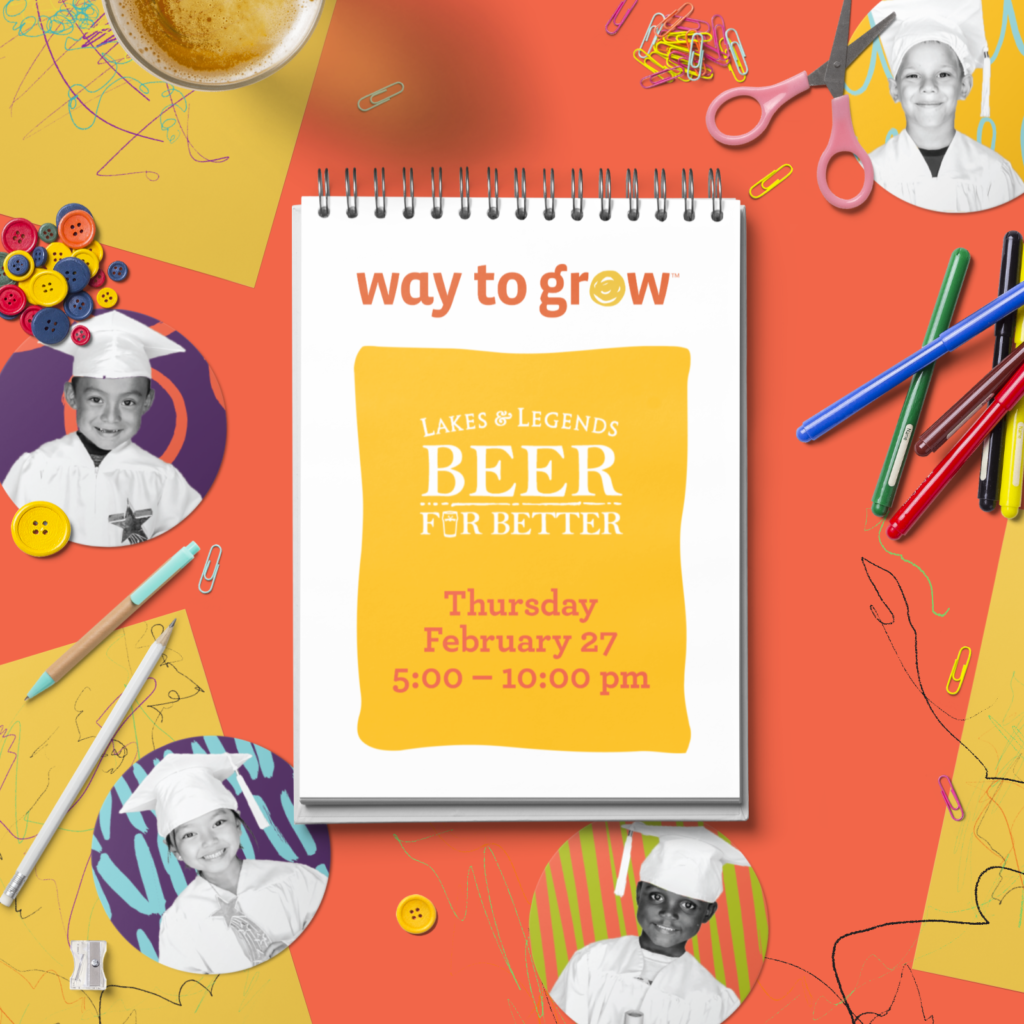
Advocacy for Children Day celebrates early learning and gives parents, teachers, early care and education professionals, and communities from across the state an opportunity to come together and be a voice for Minnesota’s children.
As part of Way to Grow’s My Voice Matters initiative, led by the MinneMinds Coalition, our staff and members of families we serve rallied at the Capitol in support of equitable, child-centered, parent-directed, mixed delivery approaches to state policies affecting families and children.
The 2019 policy agenda of MinneMinds leads efforts to improve and support:
Quality: Parent Aware and Kindergarten Entry Profile
- Fully fund Parent Aware to continue the expansion of high-quality early learning programs throughout Minnesota with a priority on stronger recognition and incorporation of culturally relevant needs.
- Support and fund state-wide expansion and implementation of a culturally and linguistically relevant Kindergarten Entry Profile (KEP) via approved assessment tools.
Access: Early Learning Scholarships
- Support efforts to expand scholarships that meet the needs of low-income children from birth to 5 years old and prioritize children with the highest needs.
- Make early learning scholarships more flexible to ensure children and families have access to quality early learning.
Access: Home Visiting
- Increase access, flexibility, and funding for targeted home visiting programs.
- Increase collaboration and coordination among home visiting and early childhood providers to improve outcomes for families.
Access: Provider Pipeline and Workforce Growth
- Increase funding for grants, tax credits, and policies for early childhood providers.
Access: Childcare Assistance Program (CCAP)
- Support family and provider-friendly provisions of federal reauthorization and serve more CCAP eligible families.
- Ensure CCAP eligibility and access for families who are experiencing homelessness.
Way to Grow attendees received a tour of the Capitol, heard from legislators, experts in the education field, and other parents on the impact that early education has on their lives and our communities. Lastly, everyone in attendance was given a call to action and tips on how to contact their legislators when advocating for early education. Find those tips here, and to learn more about Way to Grow’s My Voice Matters initiative, contact Megan McLaughlin at 612-874-4740, or at mmclaughlin@mplswaytogrow.org.
“It is a happy talent to know how to play.”
– Ralph Waldo Emerson
Playtime is one of the most important ways to promote healthy child development. Children learn, flex their creative ability and curiosity, interact with others, grow, and most of all have fun! Both children and adults benefit from playtime, especially in an open and shared environment that allows each individual to hone in on and improve their social, behavioral, and emotional skills.
Way to Grow is proud to offer such an environment to the community through its Play to Grow program.
Offered free of charge, Play to Grow is a weekly early learning class that provides curriculum-based learning opportunities for children under the age of five and their parents. During these sessions, families have access to Family Educators for home visits, health, early education, and to Resource Advocates for connections to services. Play to Grow not only offers great socialization opportunities for children, but is an environment where parents can socialize with one another.
The group is held every Wednesday from 10:00-11:30 AM in the Way to Grow Family Room at Lucy C. Laney at Community School in North Minneapolis and is open to the public. Each Play to Grow session contains five elements:
- Free play
- Circle time
- Snack time
- Table activities/sensory play
- Free play (repeated)
While Play to Grow officially starts at 10:00 AM, parents and children may arrive as early as 8:30 AM for extended free play while our Family Educators set up.
Free play is an important part of our program because it encourages children to interact with the environment around them on their own terms. It allows children to use their dexterity, creativity and imagination, and motor skills. Additionally, it helps them build their confidence and teaches them to work in groups, so they learn how to play with others through sharing and the occasional time where a conflict needs to be resolved.
Circle time is a group interactive time where the children and adults come together to focus on one activity, led by a Family Educator. Usually, circle time will consist of an interactive story, singing, or reading. This time is important because it allows the children to bond as a group over a common interest, but in a setting where they are being taught by an educator.
Because childhood is a crucial time for development and growth, Play to Grow provides a snack time with healthy and nutritious foods to supplement the children’s midmorning needs between meals. Plus, who didn’t love snack time as a kid (and even as an adult now)!
The program then leads into table activities and sensory play held in different stations throughout the room. Typically, there is a sensory table, play-doh, and a craft project for the children. Sensory play is valuable because these activities stimulate the children’s senses of touch, smell, taste, movement, balance, sight, and hearing. It leads the child to learn more complex tasks and supports cognitive growth.
As the day circles back into free play and winds down, this time allows the parents more time to interact with one another as well as with Family Educators. While Play to Grow is valuable for children, it is equally as valuable to adults as it allows time for socialization and peer networking. But you don’t have to take our word for it. Here’s what parents are saying about Play to Grow:
To learn more about Play to Grow, contact Ronel Robinson at rrobinson@mplswaytogrow.org or at 612-874-4740.
Read more about the development of social skills in young children: https://waytogrow.org/the-value-of-social-skills/
Starting early developing social skills in children prepares them for healthier interactions in all aspects of their lives. Having social skills is an integral value in all functioning societies. Communicating properly with others, demonstrating good manners, expressing personal needs, and being considerate of feelings are all important components of solid social skills.
Play to Grow is a free weekly early learning class that provides curriculum-based learning opportunities for parents and children under the age of five. During these sessions, families have access to Family Educators for home visits, health, early education, and to Resource Advocates for connections to services. Play to Grow not only offers great socialization opportunities for the children, but is an environment where parents can socialize with one another and ask our Resource Advocates for advice.
Many children, like some adults, are more naturally inclined to adapt to social situations than others, making them the type of people that others gravitate to and for whom making friends is an easy process. While social skills can be learned, it is important that children are able to form meaningful and genuine bonds with others. These bonds will help them empathize and interact appropriately and allow them to adapt and navigate uncomfortable situations and environments.
One should not assume that children play just to pass the time. Actually, children gain most of their skills through playing. Playtime allows them to express interests, bond with others over shared interests, and explore and shape the world around them, and it gives parents the opportunity to teach their children new skills while playing. During these child-parent playtime moments, it is important for you to reinforce those learned skills by providing positive feedback. This will allow the child to feel more confident and secure in their development.
Feelings are an important aspect of social skills. As children grow older, it is important for parents to discuss feelings with their children. These discussions will allow them to understand and interpret the feelings of others, as well as their own. Feelings are a form of expression, so when children learn words associated with those feelings, they can later use them to talk about their emotions instead of acting out frustrations.
The following strategies can enhance a child’s social development:
Teach empathy: Provide examples of different scenarios and ask the child how other people might feel when certain things happen, then substitute different situations each time.
Talk about personal space: Explain that personal space is one’s own area around them that makes them feel comfortable. Run through what would be their own personal space, why it is important, and proper ways to interact with others during playtime.
Practice social cues: Teach children the proper way to get someone’s attention, join a group of others who are already playing together, and ways to start conversations with others.
Teach sharing and taking turns: Sit with your child for at least an hour a day to play with them and explain what it means to wait, take turns, and share.
By practicing social skills, children will have the ability to build gratifying relationships with others and adjust to different environments in society with ease. As children grow older, they interact more with people in situations and environments where direct supervision by parents is not possible. Being able to draw from what they learned from home and educational settings about socializing, children make friends within their peer group that will help refine their skills as they grow and mature.
These friendships are important for all children to develop and need to be given the opportunity to at all ages. Friends serve central and vital functions and fulfill children in ways that parents cannot, and they play a crucial role in helping define themselves and develop their sense of identity.
As mentioned earlier, while social skills can be learned, teaching them can be learned as well. If you or you know of a parent that would like assistance in all aspects of social skills development, please refer them to Way to Grow and Play to Grow, as we cover all skills mentioned in this blog.
Play to Grow is held every Wednesday from 10:00 AM to 11:30 AM at Lucy Laney at Cleveland Park Community School (3333 Penn Ave N, Minneapolis, MN 55412).
From a pajama- piñata party to food bazaars, from balloon parties to buildings, our preschoolers have expanded their minds and horizons all while exploring their imaginations. While these moments are now memories, and some of these children are graduates, we wanted to take a trip down memory lane and share with you a few wonderful moments from our two preschools this past school year.
Music with Ms. Nora from MacPhail (North Preschool)
Making up a session that was missed because of weather, Ms. Nora came in with a purpose. Our teachers had informed her that the class was going to the zoo later in the week, so she came prepared with songs about animals and going to the zoo. The children played with different animal toys that she brought, sang different animal songs, and moved around the classroom pretending to be animals. To round out their last session with her for the school year, they played with sand blocks, drums, and maracas.
Music is an important and wonderful part of education and we are so grateful for Ms. Nora and our friends at MacPhail Center for Music!
Advocacy Day at the Minnesota State Capitol
Turning momentum into action, our preschool children accompanied their parents and Way to Grow staff to the Minnesota State Capitol to rally for early education. After boarding the bus and singing songs, a flood of yellow Way to Grow t-shirts entered the rotunda, where parents heard from education professionals and advocates while the children got to sing songs and were read to by legislators. Way to Grow Parent Champion Mina Thao even took the stage to share her story on how access to early education programs like Way to Grow have positively impacted her and her children’s lives.
“Witnessing their parents being active on any front leaves a positive impression on a child,” said Way to Grow Program Director Megan McLaughlin. “It was a great opportunity for the families to learn and experience the State Capitol in very different ways.”
Our families were then taken downstairs, where they were able to enjoy a snack, do some activities, and experience one-on-one time with legislators. We knew it was a long day because on the bus ride back to the preschools, a few of the children fell asleep. Who knew advocacy could be so tiring!
“Building” a Foundation of Learning (South Preschool)
It is always amazing to see the learning epiphany in children when they discover that just about everything they learn can be a career. For example, something as simple as building blocks can lead into a conversation about buildings and structures.
The South Preschool classroom was transformed into a cardboard workshop with boxes and supplies, and our children went from curious to becoming hands-on engineers! They were able to focus their skills individually and also cooperatively working with others to create some incredible structures.
This is a great reminder to always look for opportunities to learn in places you wouldn’t expect them and take action on them!
THE Trip to the Como Zoo
Even though the first zoo in the world was established in 1500 B.C. in Egypt, zoos remain wildly popular in the world and a driving force behind that are children’s interest, curiosity, and love for animals. Our Way to Grow children are no different, and after weeks of learning, singing, and pretending to be animals, there was no better way to finish the school year than a trip to the Como Zoo. We also invited their parents because you are never too old to go to the zoo!
Even though some parts of the zoo were under construction, the children were able to see all the animals they wanted to see on a list they made prior to their visit. From reptiles to mammals, the children got to experience and learn about the animal kingdom first hand. They also got to snack on animal crackers, which was intentionally planned by the teachers.
A huge thank you to our friends at the Como Zoo for hosting our families – and for everything they do for the Twin Cities community!
Sharing and reflecting on all these wonderful memories already has us looking forward to the next school year, we cannot wait to share with you what is to come!
Our parents want to have their voices heard at the school level and beyond, yet many do not have the resources, support, or confidence to do so. We consistently hear that parents want to know whether their child is enrolled in the best school for them or how to partner with the school to communicate about their child’s education. We also know that there are specific community voices that need to be heard, such as a call for culturally appropriate education for African American, Native American, Hmong, and Somali communities. Yet in order to be empowered to speak up and be heard, our families must first become more educated and engaged in education, policy, and advocacy. Way to Grow is working to do just that.
Launched in August 2017, with funds from MN Comeback, Way to Grow’s My Voice Matters initiative amplifies the voices of some of the most isolated families in Minneapolis and works to address the lack of information available to parents. A parent engagement and advocacy initiative, My Voice Matters involves parents in advocacy and empowers them to make the best choices for their children. Through our Parent Champion Workshop Series, field trips, resources, and additional experiences to familiarize parents with the legislative process and advocacy, My Voice Matters aims to create a lasting impact on the lives of our families and children.
For the past year, Way to Grow has been working with key partners—including the Children’s Defense Fund, Joyce Preschool, MinneMinds, Northside Achievement Zone, Think Small, Greater Twin Cities United Way, and the YWCA—to assist in planning, family recruitment, and workshop facilitation. Together we are making the concerns and questions of our families heard at the school level and all the way to the Capitol.
“I am so impressed with parents showing up at public policy events and using the skills they learned in our trainings,” says Way to Grow Program Director Megan McLaughlin. “It’s so exciting to watch parents who feel they don’t have a voice become champions for not only their children, but for issues that face all young children.”
Always striving to improve our services and the Minneapolis community, Way to Grow’s Family Educators have participated in a week-long training, and we have now become a part of the Parents as Teachers (PaT) network as an affiliate.
PaT promotes optimal early development, learning, and health of young children by engaging and supporting their parents and caregivers through an evidence-based education model rather than an evidence-informed education model. With PaT, Way to Grow will be following a home visiting curriculum where actual research has been conducted on the specific topics within the curriculum.
Founded in 1984, the PaT network serves more than 195,000 children in all 50 U.S. states, over 100 Tribal organizations, five other countries, and one U.S. territory. PaT has four primary goals:
- Increase parent knowledge of early childhood development and improve parent practices
- Provide early detection of developmental delays and health issues
- Prevent child abuse and neglect
- Increase children’s school readiness and success.
This model has been rigorously tested by peer-reviewed studies and shown to produce results. More than a dozen outcome studies have been done on the effects of the PaT model. The evaluations have been verified and supported by various states, school districts, universities, research organizations, and private foundations. Evaluation results show:
- Children’s developmental delays and health problems are detected early
- Children enter kindergarten ready to learn and the achievement gap is narrowed
- Children achieve school success into the elementary grades
- Parents improve their parenting knowledge and skills
- Parents are more involved in their children’s schooling
- Families are more likely to promote children’s language and literacy.
As a first step, our Family Educators are currently training on a home visiting curriculum focused on the prenatal stage to age three. Later this year, they will attend an additional training that will extend the curriculum to age 5, adding in academically driven session that go along with Way to Grow’s readiness numbers.
While Way to Grow has spent the past month celebrating National Nutrition Month, our commitment to weaving education, wellness, and nutrition throughout all our programming continues every day of the year through our Growing Strong program.
Research demonstrates strategies that target young children are more effective when parents are involved in learning about and preparing healthy foods. Parents who lack knowledge about healthy foods and nutrition are less likely to make healthy food choices for their family.
According to Wilder Research’s study on Nutrition and Students’ Academic Performance, “Minnesota youth face a number of food-related concerns, such as poor nutrition, obesity, and hunger.” Additional studies show that nutritional deficiencies early in life can negatively affect overall health, cognitive development, concentration, and academic performance.
Way to Grow’s Growing Strong childhood nutrition program serves low-income, at-risk Minneapolis families through a holistic model of home visiting, center-based preschools, and community-based classes and events.
We are working to foster changes in nutrition behavior among our families and to close the gap of access to healthy foods among communities of color. Barriers to good nutrition include lack of knowledge about healthy foods, lack of access to healthy foods, and lack of skills in preparing healthy food. To reduce these barriers, our Growing Strong program:
- Increases direct access to healthy foods
- Increases knowledge about healthy eating and food preparation
- Changes nutrition behavior.
Through our programs and services, our ultimate goal is to systematically change nutrition behavior in our children’s homes, our preschools, and in the community at large.
Using an evidence-based approach, Growing Strong improves childhood nutrition by increasing parents’ and children’s nutrition knowledge and ensuring direct access to healthy food to support long-term nutrition behavior changes. Additionally, the Growing Strong program is implemented through a family-centered, multi-generational approach over multiple years that allows us to weave nutrition education throughout all we do for our families and children.
During our home visits, family educators teach families about nutrition using such resources as USDA’s My Plate, Food Labels-Nutrition Facts, 10 Tips to A Great Plate, Daily Food Plans for Adults and Toddlers, and other educational materials.
Way to Grow’s Preschool Pals and P.A.L.S. children engage in hands-on nutrition games and activities and have the opportunity to hear from guest speakers. The snacks and meals we provide meet nutrition requirements and help supplement our curriculum, as well as the nutrition education their parents receive. In addition, Way to Grow partners with the University of Minnesota Extension to offer our Cooking Matters classes to families. (Learn more about this exciting initiative in a previous blog post.)
“Healthy choices and habits make for a healthy mind and overall better quality of life,” explains Megan McLaughlin, Way to Grow Program Director. “Starting with the parents allows us to build a strong foundation and instill values about nutrition that they can easily apply at home and in their everyday lives.”
Healthy kids who eat well are ready to learn—and we are working each and every day to ensure that all children have an equal opportunity to succeed in school and life!


